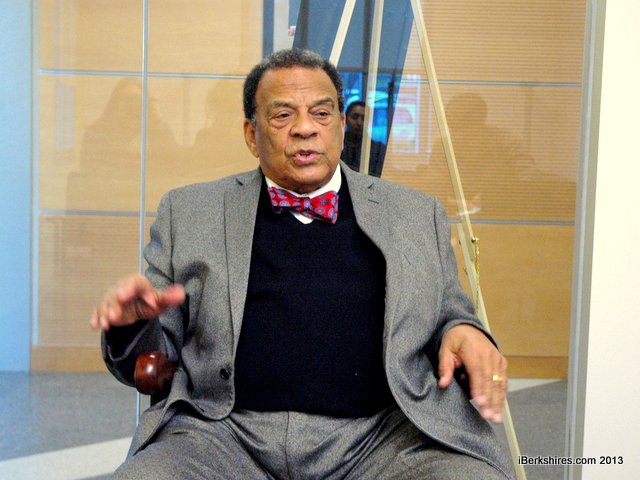Andrew Young Talks 'Legacy of Freedom,' Civil Rights, Voting
 Andrew Young, a former politician and civil rights leader, spoke to the press prior to his scheduled lecture at MCLA on Wednesday. Andrew Young, a former politician and civil rights leader, spoke to the press prior to his scheduled lecture at MCLA on Wednesday. |
NORTH ADAMS, Mass. — Former congressman, U.N. ambassador, mayor of Atlanta and civil rights leader Andrew Young said on Wednesday afternoon he planned to deliver a message of "a continuing legacy of freedom" in America, prior to his scheduled lecture at the Massachusetts College of Liberal Arts.
Young stressed this legacy started long before his own battle for freedom that climaxed in the 1960s — all the way back to Colonial times.
"I think it's followed the history of this nation from the beginning, but as it came from abroad most of the people who settled here came from somewhere else seeking religious freedom," Young said. "They found it but they created a very free and technical environment that has changed the world."
Young said the invention of the printing press not only drew the Pilgrims here because of the Bible's translation and accessibility but caused the Hundred Year War in Europe. He said it took the world about 400 years to adjust to the printing press. Young explained that technology can cause turmoil, challenges and opportunities for those looking to move forward.
"I think the great tension in our world today is those who want to move on and take on a challenge of the planet and the universe and those who want to try to hang on to something in the past that they don't even remember," he said. "But there's a fear of change and there's an acceptance of the challenge of change and I think that's the division."
Young, 81, also discussed his role and views of the Civil Rights Movement and that accessible voting and balanced districting are important for democracy.
He said he didn't feel like he accomplished anything personally, referring to the passage of the Civil Rights Act of 1964 and the Voting Rights Act of 1965, but rather that he and his peers, most notably his friend Martin Luther King Jr., were "part of a sweep of history" that to him was orchestrated by God through poor people, government and certain economic circumstances.
"We sort of put ourselves in the path of history, in the path of the progress of the people or we were pushed by the hand of God — you can call it whatever you want to call it, but it required us to risk our lives to a certain extent," Young said. "There were half a dozen that got killed around that time that contributed to that. It can never be my accomplishment."
Instead, he stressed for people to figure out why things aren't right and to act.
"If you keep asking people 'why not?' you know you'll end up with a bunch of people who say why not and they'll go out and do things that their parents think were impossible. There's no way anybody could have imagined all the things that happened in my life, including me, and they say, 'how did you plan it?' I didn't plan anything. I just did what I had to do one day at a time, and it happened that we were in tune in history, and in tune with what God was trying to do in the world and it happened."
In terms of more recent voting, Young expressed concern with the voter identification laws and redistricting for political reasons.
"I think [the voter ID laws are] all designed to make it more difficult to vote, which puts them in a class with China and Russia. That's not where America ought to be. But it's not working ... I think when people think everything is alright they'll leave it to somebody else," Young said, noting that people do get peeved when it comes to obstructed voting.
In addition, Young said congressional redistricting can damage compromise in government and reflected on his own experience as a congressman. In his district, he represented a mix of Democrats and Republicans, blacks and whites. He said this gave him the ability to make a controversial decision so he could call his shots in his best discretion.
"I didn't mind losing an election because no one can blackmail me into voting a certain way," he said. "I never lost the freedom in my vote because I had a racially and politically balanced district. And that's where I think you get the best democracy."
Young said we'll never all agree, but democracy depends on balance.
"The key to democracy is being able to disagree without being disagreeable and let history prove what's right," Young said. "But you haven't gone so far that if it's wrong you can't back up."
Young spoke at the MCLA Church Street Center as part of the third annual Michael S. and Kitty Dukakis Public Policy Lecture Series on Wednesday evening.
Tags: civil rights, lecture, MCLA,
 Andrew Young, a former politician and civil rights leader, spoke to the press prior to his scheduled lecture at MCLA on Wednesday.
Andrew Young, a former politician and civil rights leader, spoke to the press prior to his scheduled lecture at MCLA on Wednesday. Andrew Young, a former politician and civil rights leader, spoke to the press prior to his scheduled lecture at MCLA on Wednesday.
Andrew Young, a former politician and civil rights leader, spoke to the press prior to his scheduled lecture at MCLA on Wednesday.